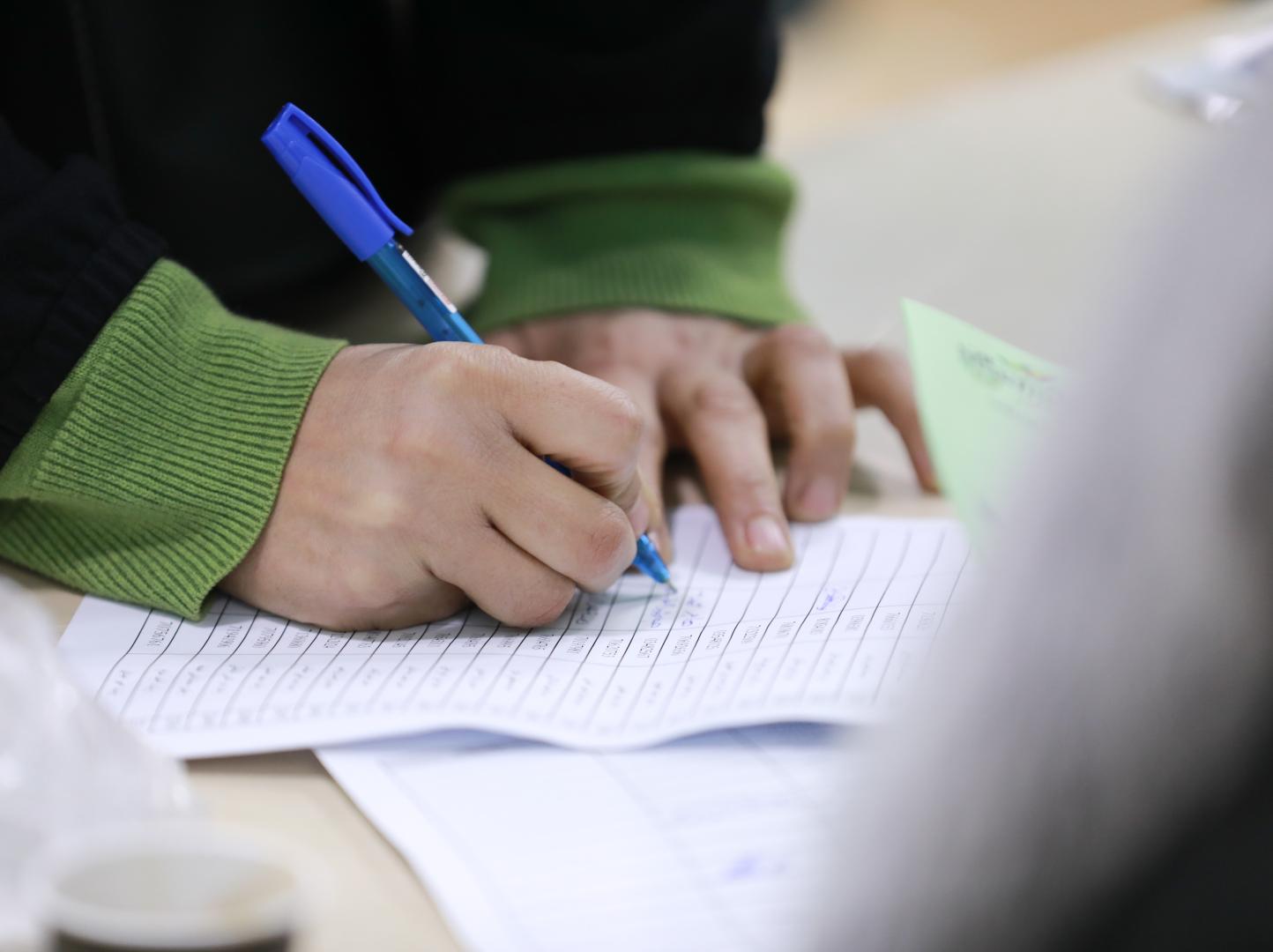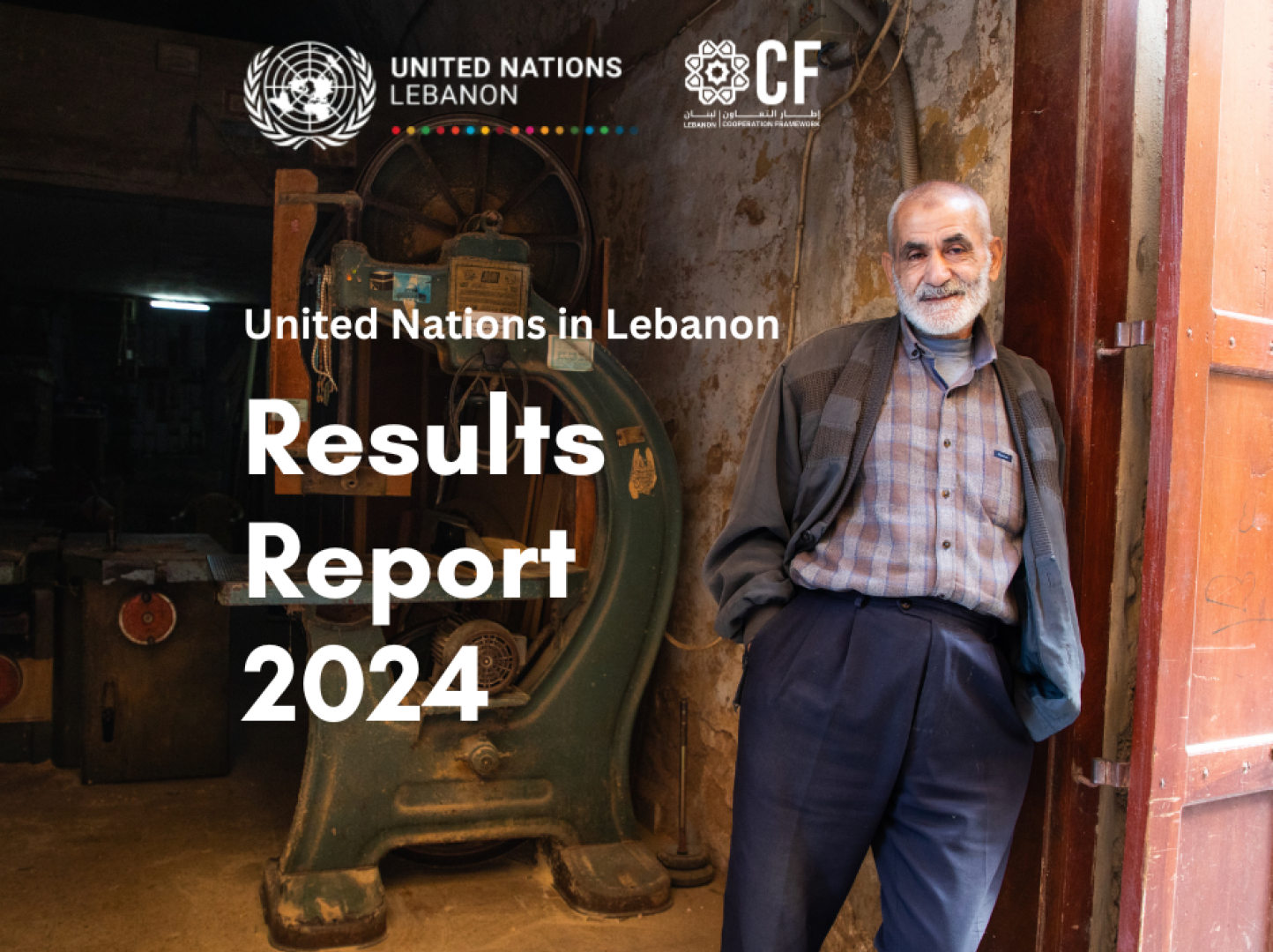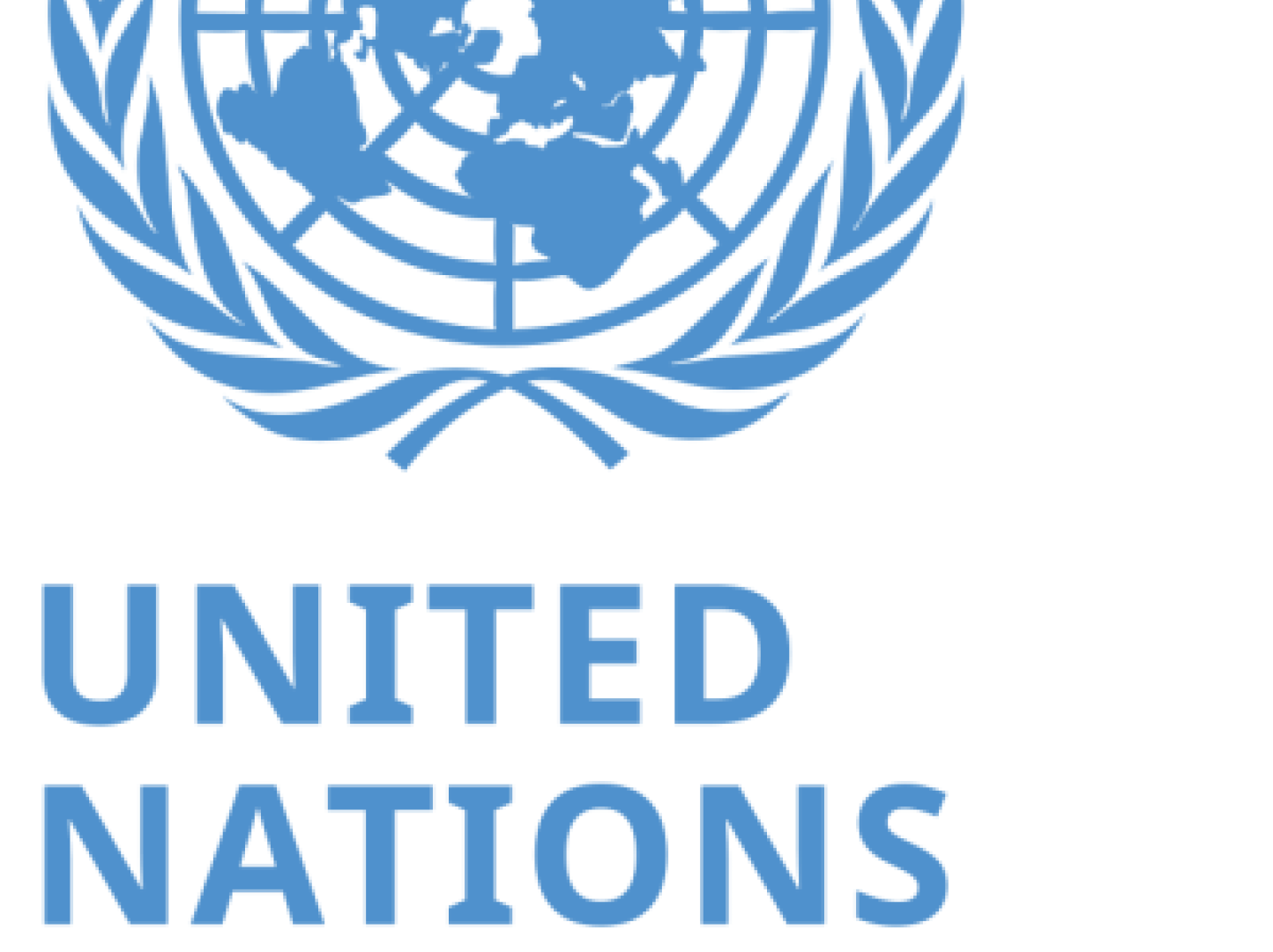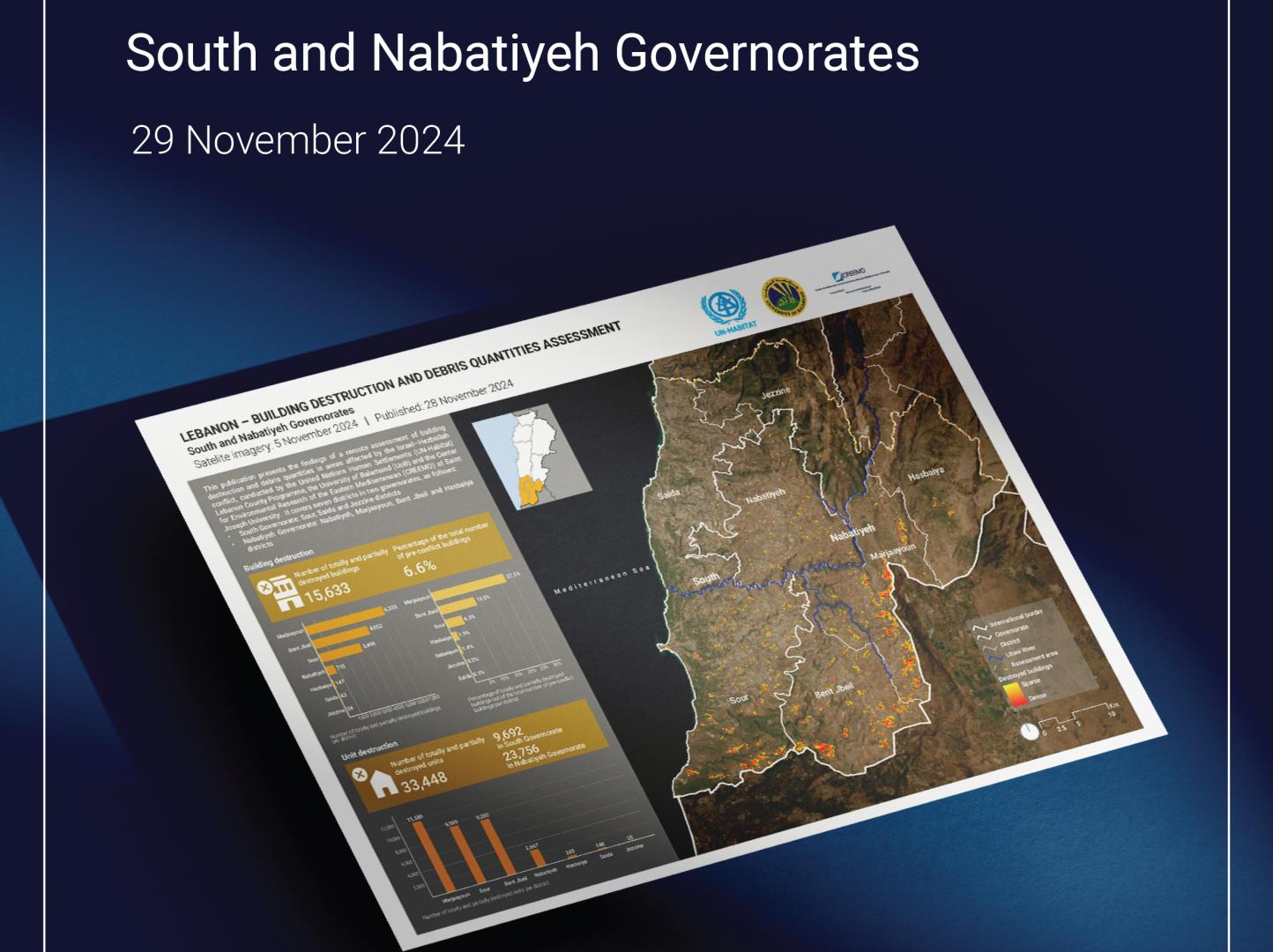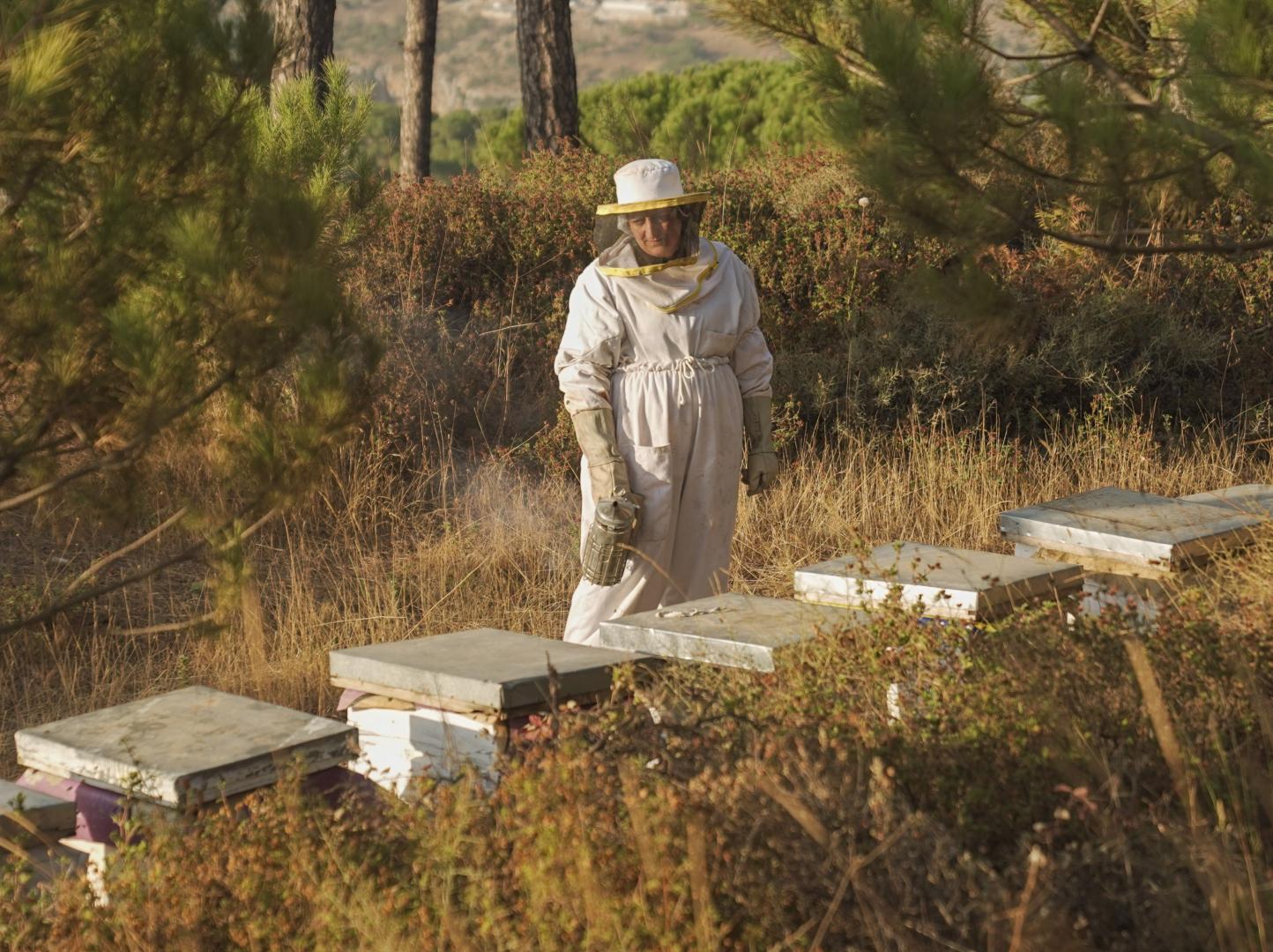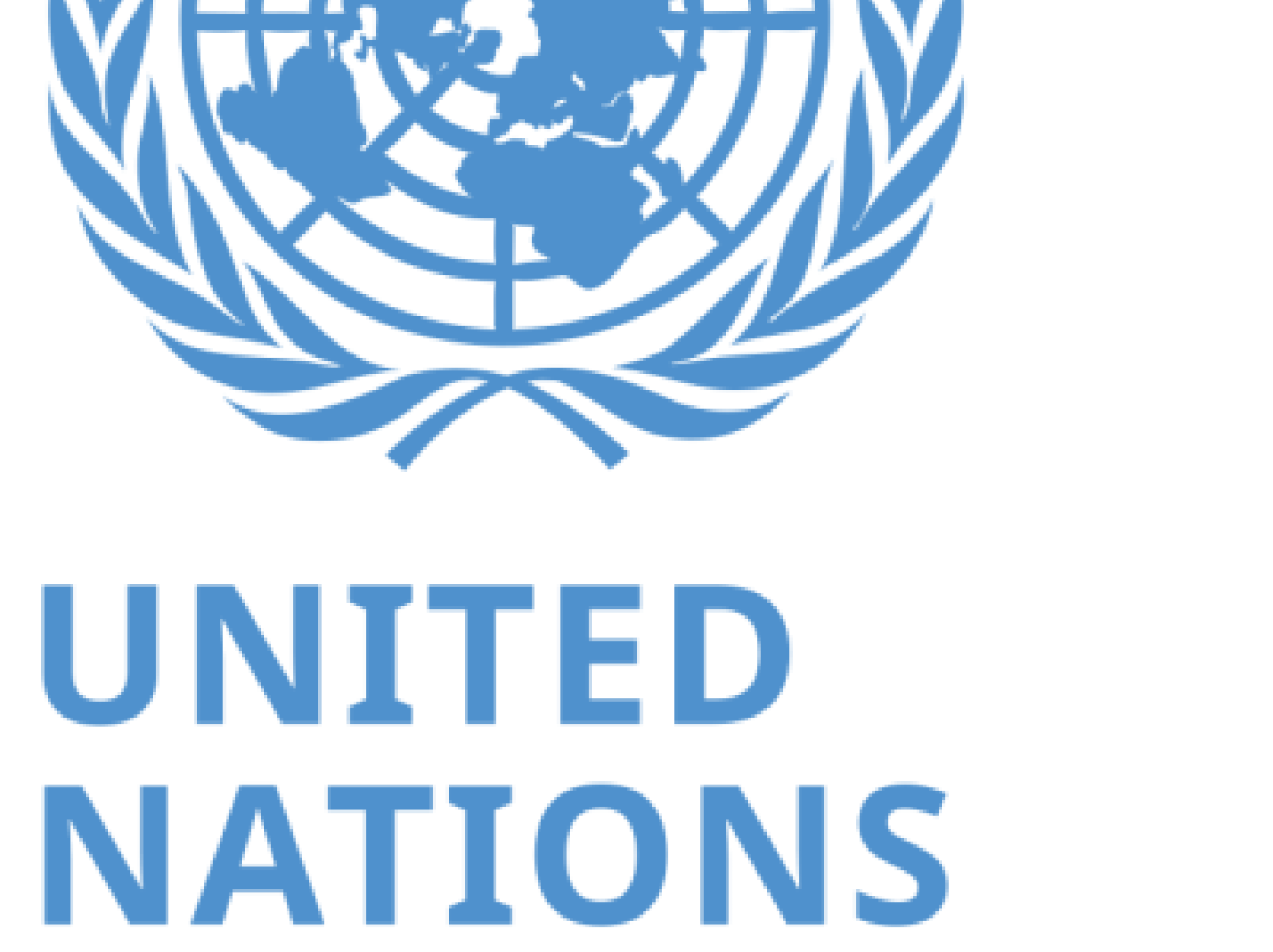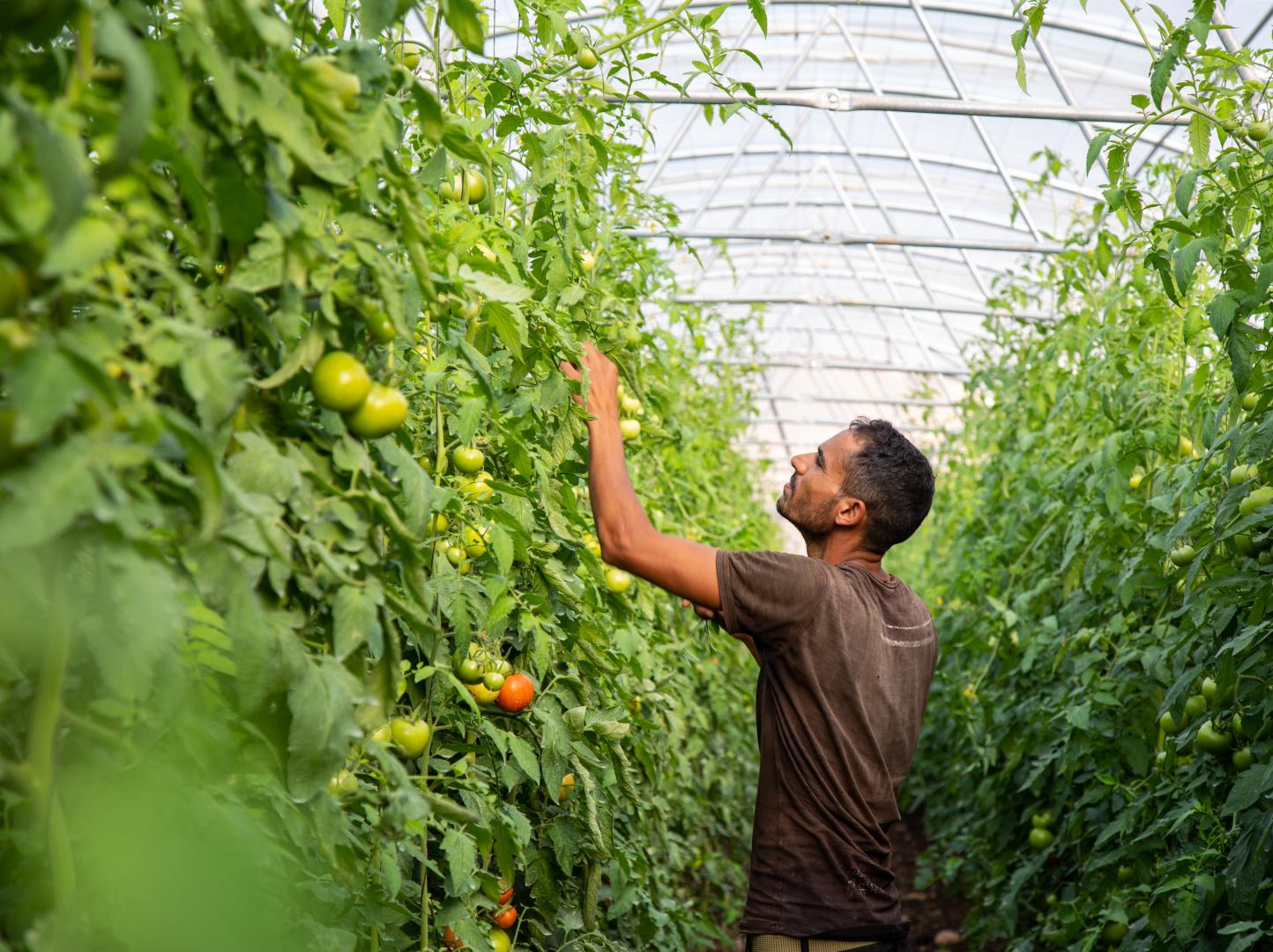Latest
Press Release
31 October 2025
United Nations Lebanon and Maharat Foundation Launch Second Phase of #InformationIntegrity Campaign in support of the Reform Process
Learn more
Press Release
31 October 2025
Over USD 1.5 Million in Support for Lebanese Women-Led Businesses Driving Economic Recovery
Learn more
Video
29 October 2025
If Reform were a person… what would you say to them? - New UN Lebanon & Maharat Foundation digital campaign coming soon
Learn more
Latest
The Sustainable Development Goals in Lebanon
The Sustainable Development Goals are a global call to action to end poverty, protect the earth’s environment and climate, and ensure that people everywhere can enjoy peace and prosperity. These are the goals the UN is working on in Lebanon:
Publication
13 November 2025
Aid to Lebanon: Tracking of development aid received to Lebanon
The UN works with donor partners and national/international implementing partners in Lebanon to provide the government with real-time and transparent information on aid flows coming into Lebanon. These aid flows include development, humanitarian, peacebuilding and all other types of funds in support of Lebanon. Since 2016, the UN has collected reports on funding flows from Government donors to national entities, UN agencies, NGOs, Lebanon-specific funds and other actors and partners, including the private sector.This is done through cumulative quarterly updates on reported available funds (carry over and disbursed) and known future/expected commitments to Lebanon. The quarterly updates also present an overview of support by donors and available funds for the Lebanon Response Plan and Lebanon Flash Appeal. Check out the latest update on the reported allocated grants and future commitments: Aid tracking Results as of 30 September 2025.You can check the links below to view previous funding updates for Lebanon in 2017, 2018, 2019, 2020, 2021, 2022, 2023, and 2024.
1 of 5
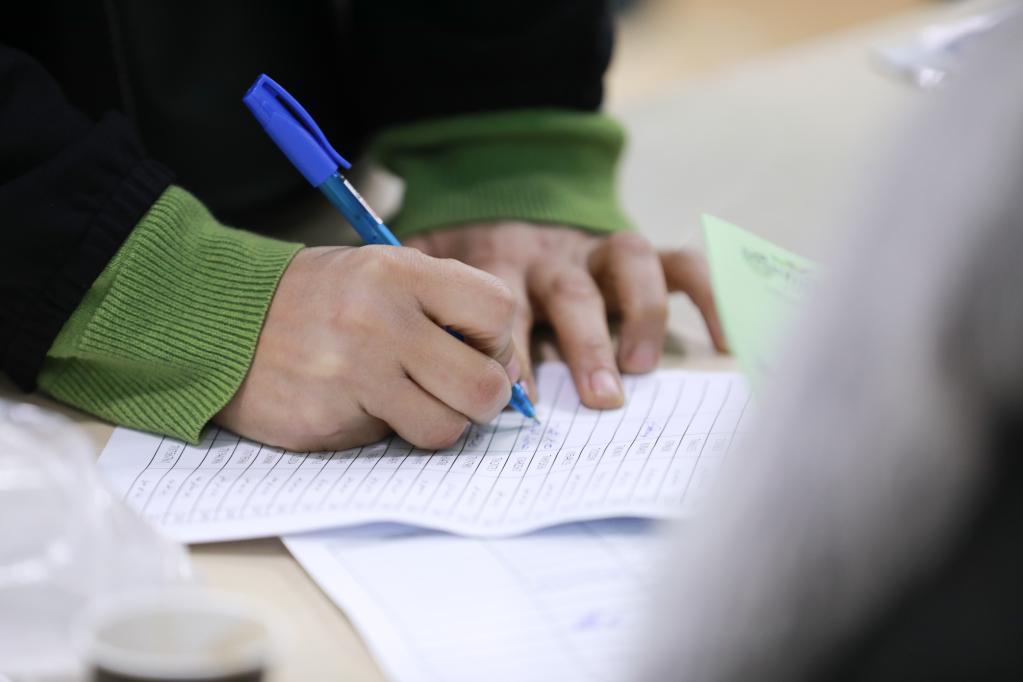
Story
30 April 2025
Rebuilding Hope: Lebanon’s Journey toward Sustainable Recovery through Debris Management
The recent conflict in Lebanon between Israel and Hezbollah, which further escalated significantly in late 2024, has left a trail of devastation. Thousands have lost their lives, countless areas have been reduced to rubble, and critical infrastructure has been shattered. At the height of the crisis, about 1.3 million people were internally displaced. The sheer scale of destruction has resulted in millions of tons of debris, posing both immediate hazards and long-term recovery challenges. Amid this destruction, the United Nations has mobilized a ‘UN Debris Taskforce’, to coordinate a sustainable and human rights-based approach to debris management. The Task Force aims to ensure a safe, efficient, and environmentally responsible recovery while safeguarding affected communities’ rights to housing, health, and a safe environment. War Debris: An Opportunity for Lebanon’s Recovery The unprecedented destruction has transformed once-thriving neighborhoods into hazardous zones. Families returning to their homes face significant risks from unexploded ordnance (UXOs), environmental contaminants, and structurally compromised buildings. Additionally, schools and some of Lebanon’s cultural heritage sites now lie in ruins. Structural collapses and the mixing of domestic waste with debris have exacerbated health and environmental hazards, creating an urgent need for intervention.“The environmental and safety challenges are immense,” said Mrs. Jihan Seoud, an expert from the United Nations Development Programme (UNDP) with extensive experience in debris management. “But with the right strategies and collaboration, we can turn this crisis into an opportunity for sustainable recovery.”A structured approach to debris management prioritizes recycling and reuse, reducing the demand for new construction materials while promoting a circular economy. This also creates socio-economic opportunities, enabling communities to participate actively in rebuilding efforts.Mr. Hassan Dbouk, Mayor of Tyre and Head of the Tyre Union of Municipalities, highlighted the importance of swift action. “Proper damage assessment is essential to map and categorize targeted buildings, estimate the volume of debris, and create a transport plan to ensure smooth collection and disposal.” He stressed that recycling materials like steel and aluminum must be prioritized to reduce reliance on raw resources and promote sustainability.Dbouk’s insight underscores the need to prioritize debris management as a cornerstone of recovery efforts. For Lebanon’s recovery to be effective, the government must play a central role in leading and coordinating debris management efforts, working alongside municipalities, international organizations, and affected communities. This includes defining ownership of debris, streamlining legal procedures, and identifying processing and disposal sites. Engaging local communities and returnees in rebuilding efforts ensures a more inclusive and impactful recovery process. Public awareness campaigns are critical, not only to prevent accidents involving unexploded ordnance (UXOs), hazardous materials, or structural building cracks, but also to engage and empower citizens in the recovery process. To address these risks, the UN partnered with the Lebanese Armed Forces to launch an awareness campaign on the dangers of UXOs. Additionally, it collaborated with the Ministry of Culture to launch a campaign aimed at preserving and protecting debris in heritage sites.Furthermore, by assessing debris for recyclables and hazardous content, and encouraging the reuse of materials in rehabilitation and reconstruction, Lebanon can reduce its reliance on new resources while addressing environmental threats. Accordingly, the UN, through its specialized agencies, has stepped in by undertaking a ‘Rapid Impact Assessment’ grounded in local voices, providing data from 135 areas in the post-war period across health, education, business and more, and calling for immediate action toward a people-centered recovery in the affected areas. It also conducted remote building damage assessments in the South, Nabatiyeh, Bekaa, and Baalbek-Hermel governorates and the southern suburbs of Beirut (spanning parts of the Beirut and Mount Lebanon governorates), covering 15 districts. Picking up the Pieces: The challenging return of citizens In the city of Nabatiyeh, the return of displaced residents is both hopeful and challenging. Streets once filled with bustling life now stand in ruins, and families returning home must navigate the overwhelming task of rebuilding from the rubble. It was a painful homecoming, marked by loss but also by a strong determination to start again, to rebuild, to simply survive.“After we entered our destroyed building to collect a few belongings, we gathered old family pictures that were still intact,” shared a displaced resident returning to his city Nabatiyeh. “We couldn’t afford to clear the rubble ourselves, so we asked a local contractor to remove the debris in exchange for salvaging any steel and recyclables.”This approach, while practical to avoid high costs of removal and transportation fees, often means that valuable materials for reconstruction are lost, and unregulated removal can create additional environmental and safety risks. Ensuring a structured, government-led debris management strategy is essential to prevent these hazards. The UN Debris Taskforce: Initiating a Joint Sustainable Framework At the core of UN Lebanon’s post-conflict efforts is the UN Debris Taskforce (DTF), which has developed a comprehensive framework to guide debris management in the aftermath of the conflict. The DTF is composed of ten UN entities (UN-Habitat, UNEP, UNDP, ILO, OCHA, UNMAS, UNESCO, IOM, FAO, and UNOPS) working collaboratively to ensure that debris removal is safe, efficient, and environmentally responsible while ensuring that affected populations actively participate in the recovery process.“Our goal is not just to help clear debris in the most effective ways, but to do so in a way that safeguards the environment and public health,” explained Imran Riza, the UN Resident Coordinator in Lebanon. “We are committed to promoting sustainable and environmentally friendly practices that support long-term recovery and resilience.” Elie Mansour, an UN-Habitat expert, underscored the importance of health and safety in such initiative. “Effective debris management begins with inspecting the debris for unexploded ordnance or other contaminants,” he said. “If sorting or recycling can’t occur on-site, debris should be safely transported to designated processing locations. Recycling must be prioritized to recover materials for reconstruction.”The Task Force is also leveraging international methodologies to estimate debris volume, enabling effective planning for removal, recycling and disposal in environmentally approved sites, such as abandoned quarries, to prevent further degradation of Lebanon’s landscapes. Partnerships for Recovery A successful recovery depends on collaboration between multiple stakeholders, which the UN is working closely with the Government, including the Ministries of Environment, Public Works, Health, and Culture, along with local municipalities and unions, are the main actors in shaping and implementing a sustainable debris management strategy.The Lebanese Armed Forces (LAF) and the Lebanese Mine Action Center (LMAC) also play a crucial role in risk assessments and UXO clearance, working closely with municipalities to address the dangers posed by explosive remnants of war. Additionally, academic institutions provide the technical expertise in debris quantification and management.Meanwhile, the private sector, particularly the Association of Lebanese Industrialists, also plays a pivotal role. Through public-private partnerships, they are introducing innovative recycling technologies and sustainable practices that create jobs and reduce waste.“We see this as an opportunity to build back better and greener,” said a spokesperson from the Association of Lebanese Industrialists. “Our circular economy initiatives can transform debris into reusable construction materials, fostering economic growth and reducing pollution.”Ensuring fair wages, safe working conditions, and social protections for debris removal workers remains a key priority for the UN. These principles remain central to the UN’s advocacy efforts with the Government and other partners, reinforcing a recovery process built on fairness, safety, and dignity. A Vision for Lebanon’s Future: A Rights-based and Sustainable RecoveryLebanon’s path to recovery is long, but with coordinated efforts from the government, UN, local stakeholders, and international partners, a sustainable future is within reach. By prioritizing sustainable debris management practices, cultural and environmental preservation, and a human rights-based approach, Lebanon can build a stronger, more prosperous future. “This crisis has tested us all,” said Riza. “But it has also shown us the strength of collective action and the power of the coordinated efforts of the UN and its partners, especially the government.” As Lebanon takes its first steps toward recovery, the hope is that these efforts will not only restore what has been lost but also lay the foundation for a brighter, more sustainable future.
1 of 5
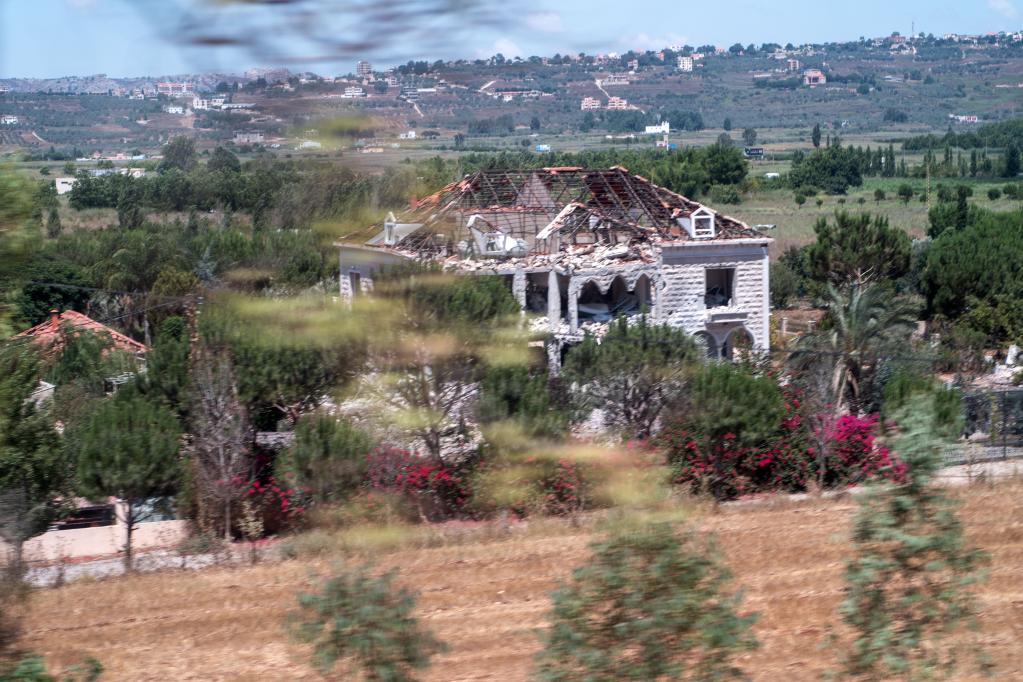
Story
21 May 2025
A Glimpse into Global Diplomacy: How a Visit to the UN House Ignited Hope and Purpose in Lebanon’s Young Leaders
On a bright morning of May 13, 2025, the air around the UN House in Beirut crackled with energy, not from political negotiations or press conferences, but from the eager chatter of nearly 80 high school students, each one a budding diplomat, thinker, or leader. Coming from Rafic Hariri High School in Saida, Brummana High School in Metn, SSCC Kfarhbab in Keserwan, these students had more in common than just their uniforms or their shared age group. They were all Model United Nations (MUN) participants, some of them national and international award-winners, drawn together by a single goal: to witness diplomacy in action.Their visit was orchestrated by the UN Resident Coordinator’s Office (UNRCO), in collaboration with the UN Information Centre (UNIC Beirut) and the Office of the UN Special Coordinator for Lebanon (UNSCOL). The day was more than a field trip. It was a journey into the heart of international cooperation and leadership, offering them rare access to the rooms where peace, justice, and development for Lebanon and the region are deliberated.“This is your space now,” said Nadine Daou from UNRCO-UNIC Beirut in her welcoming remarks. “Be curious… Ask questions… Speak up!” The students needed no further encouragement.Curiosity in the UN House Main Conference HallIn a conversational and engaging “Meet and Greet session” with Imran Riza, the UN Deputy Special Coordinator, Resident and Humanitarian Coordinator in Lebanon, the students proved themselves anything but shy. Over 20 hands shot up with questions that reflected a deep understanding of Lebanon’s complex reality and global affairs, but also insinuated to these young minds’ concerns but also aspirations for their country’s promising future. “What really struck me,” said Mayssa, 17, from SSCC Kfarhbab, “was how transparent, genuine, and down-to-earth Mr. Riza was. He didn’t sugarcoat the challenges, whether it’s the humanitarian crisis in the south or the funding shortfalls, but he emphasized hope and action. That was powerful.”Riza shared insights from his journey in the UN system, emphasizing the importance of empathy, resilience, and integrity in leadership. He spoke candidly about the humanitarian challenges from the recent hostilities in southern Lebanon, and how the UN worked under extraordinary circumstances to deliver aid and uphold international humanitarian law.“I was inspired by the energy, curiosity, and determination of Lebanese Model United Nations students today at the UN House in Beirut,” Riza later tweeted. “Their questions were sharp, their ideas bold & their hope for Lebanon unwavering.”From Virtual Reality to Real EmotionsIn one of the most emotionally resonant parts of the visit, students watched the powerful VR documentary Dreaming of Lebanon, produced by UNSCOL in collaboration with the UN Department of Political and Peacebuilding Affairs (UNDPPA); a deeply human exploration of people's aspirations through human stories in a country scarred by subsequent crises. The immersive experience left many speechless. “I felt like I was walking in someone else’s shoes,” said Ralph, 16, from Brummana High School. “It wasn’t just a movie. It showed a side of Lebanon we don’t usually see, one that’s hurting but still full of hope.”Some students removed their VR headsets with tears in their eyes. “It was emotional. I almost cried,” one whispered from Rafic Hariri High School. “But it reminded me why we need to keep pushing for change.”Mission Possible: Learning the Art of Negotiations and Diplomacy Later, UNSCOL experts, Ms. Pascal El-Kassis and Mr. Alaa Abdelaziz, briefed the students about the beginnings of UN diplomacy and conflict prevention, before leading them through a scenario-based session on negotiation and conflict resolution, blending diplomacy with real-life complexities. It was a simulated but serious exercise, reflecting the difficult conversations that often unfold behind closed doors in international negotiations, using examples grounded in the Lebanese context. “I learned that negotiation isn’t about winning. It’s about understanding the other side, compromising, and finding common ground,” said Yara, 16, from Rafic Hariri High School. “That’s something I want to apply in my own life, not just in MUN.” Challenging Stereotypes, Rewriting NormsIn a thought-provoking session with UN Women Programme Analyst Ms. Layan El-Dani, students examined photographs depicting gender roles and stereotypes. The conversation was reflective and unflinching, touching on the subtle and overt ways gender expectations shape daily life in Lebanon and beyond.“It made me realize how often we accept inequality without noticing it,” said a young man. “This discussion gave me the words and awareness to challenge it.” Ms. El-Dani encouraged students to reflect on their own environments and become advocates for gender equality, challenging long-lasting stereotypes, prompting many to think more critically about their roles in shaping inclusive futures.Messages of Hope, Seeds of ActionThe visit wasn’t only about insight; it was about inspiration. Between sessions, students viewed creative public awareness videos from the UNCG’s #TakeAStep campaign—short clips tackling issues like recycling and climate change, poverty, hate speech, and gender-based violence. Many students found them both humorous and hauntingly truthful.“These videos were absolutely stunning and compelling,” one student said. “They raised awareness about these issues in a pleasant, funny, and catchy way that will always dwell in our memory. I will surely consider taking a step toward the SDGs in my own community.”As an engaging icebreaker at the start of the visit, UNIC Officer-in-Charge, Ms. Cynthia Khoury, led an interactive quiz that sparked curiosity and participation among the students. The quiz featured questions on the United Nations, ongoing UN reform efforts, and challenged students to identify key achievements made by the UN in Lebanon throughout 2024. The questions touched on various sectors aligned with the UN Cooperation Framework’s four pillars: People, Peace and Governance, Prosperity, and Planet (Environment), offering students a fun and informative way to learn about the UN’s work and impact in Lebanon. As the day wound to a close with photos, laughter, and a well-deserved coffee break, the atmosphere was one of awakened ambition. The students left not only with pictures and souvenir materials about the UN Charter and Universal Declaration for Human Rights, but with renewed conviction to be agents of change. The Bigger PictureBehind the scenes, this event is part of a broader UN effort to strategically invest in Lebanon’s youth, driven by different UN agencies operating in Lebanon through youth-focused programs like the Youth Leadership Programme (YLP), Generation of Innovation Leaders (GIL), and Youth for Impact, among others. The message is clear: Lebanon’s future is being built not just in conferences and meetings, but in the minds and hearts of its young people.“I came here wondering what the UN actually does,” said Maurice, 17. “Now I leave wanting to be part of it.”In a time when the news is often dominated by crises, this visit to the UN House served as a reminder that hope is not lost, it’s rising, one young leader at a time.Watch a wrap-up video of the visit below:
1 of 5
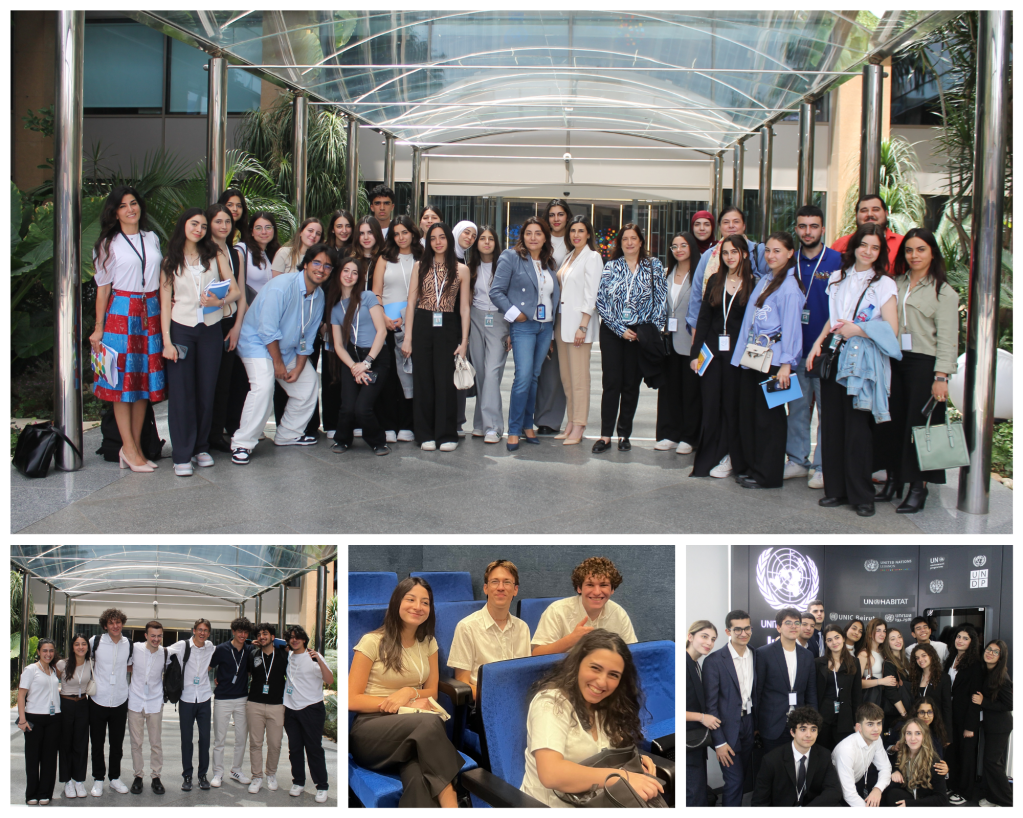
Story
03 December 2024
Women-Led Kitchen Becomes a Lifeline for Displaced Families and Persons with Disabilities during Lebanon’s Conflict
Today, December 3, as we mark the International Day for Persons with Disabilities, the United Nations in Lebanon celebrates the extraordinary stories of resilience, leadership, and empowerment in times of crisis, exemplified by the ‘Access Kitchen’ initiative in Lebanon. Launched in 2022 by UN Women in collaboration with the Lebanese Union for Persons with Physical Disabilities (LUPD), this women-led community kitchen is a beacon of hope for women with disabilities, who are using their skills, leadership, and determination to support their communities and uplift people in need amid unprecedented challenges facing the country. A Kitchen That Transforms Lives‘Access Kitchen’, designed to accommodate the diverse needs of persons with disabilities, trains women to prepare and distribute hot meals to underserved families. The initiative tackles Lebanon’s food insecurity caused by the crisis while promoting social inclusion, gender equality, and economic empowerment of women with disabilities. Before the conflict, Access Kitchen employed 40 women with disabilities to produce over 1,000 hot meals for vulnerable families living in Beirut.As Lebanon faced the devastating impacts of the war that significantly escalated in September 2024, the kitchen became a lifeline for displaced families and persons with disabilities, producing and distributing over 9,000 hot meals to those seeking refuge in collective shelters. Funded by the Government of Australia and previously by the Government of Japan, Access Kitchen scaled up its operations in October 2024, reaching even more vulnerable populations, including individuals living outside collective shelters. The World Food Programme (WFP) has also supported LUPD with in-kind contributions through raw materials to produce hot meals. Voices of Leadership and HopeThe women of Access Kitchen are more than chefs; they are leaders, advocates, and changemakers. Each one of them brings a unique perspective and drive to build a more inclusive society where every person counts, and every need is heard. Riwa Hattab, 21, reflects on her journey in a kitchen that has become a vital part of her life and her extended community family: “As a woman with a disability, I feel a strong sense of responsibility towards my community. The war may have made us more vulnerable, but it also showed us the power of solidarity,” she said. Highlighting how personal challenges can inspire determination and drive positive change, Riwa added, “My disability didn’t hold me back from delivering assistance; on the contrary, it fueled my resolve and determination. We can use our experiences to communicate, adapt, and promote inclusivity.“Today, we stand firm in asserting our right to a full and meaningful life while contributing to our community’s growth” - Riwa.For Samira Yamout, 26, the sense of pride and strength she gained was immense, let alone leadership. “Delivering hot meals to displaced families fills me with pride. I urge all women with disabilities not to succumb to vulnerability but to find strength within. By being leaders and supporting each other, together, we can show the world we are not just survivors but also leaders in times of crisis.” Hanan Bathatha, 31, highlights the great sense of fulfillment she found in serving others:
“Helping my community makes me feel I have a valuable role in society. It’s time to dispel the misconception that women with disabilities are not part of the solution. Let’s unite and show the world our potential to make significant contributions.” A Call for Inclusion and DiversityThe success of ‘Access Kitchen is a testament to what is possible when inclusion is prioritized. By equipping women with disabilities with the tools and opportunities to lead, this initiative proves that diversity is not a limitation but a strength.As we mark this significant day, the stories of Riwa, Samira, and Hanan inspire us to call for a world where people in their diversity, have the chance to thrive. These stories recognize women and girls with disabilities as rights holders and agents of change in all contexts. Their journeys remind us of the importance of giving voice to persons with disabilities, including women, ensuring their equal representation, upholding their dignity, and working together to build a more inclusive and resilient society. *** THE END***Discover the UN’s vision and unwavering commitment to the inclusion of persons with disabilities. Learn more at: https://www.un.org/en/content/disabilitystrategy/ . #InclusionMatters
“Helping my community makes me feel I have a valuable role in society. It’s time to dispel the misconception that women with disabilities are not part of the solution. Let’s unite and show the world our potential to make significant contributions.” A Call for Inclusion and DiversityThe success of ‘Access Kitchen is a testament to what is possible when inclusion is prioritized. By equipping women with disabilities with the tools and opportunities to lead, this initiative proves that diversity is not a limitation but a strength.As we mark this significant day, the stories of Riwa, Samira, and Hanan inspire us to call for a world where people in their diversity, have the chance to thrive. These stories recognize women and girls with disabilities as rights holders and agents of change in all contexts. Their journeys remind us of the importance of giving voice to persons with disabilities, including women, ensuring their equal representation, upholding their dignity, and working together to build a more inclusive and resilient society. *** THE END***Discover the UN’s vision and unwavering commitment to the inclusion of persons with disabilities. Learn more at: https://www.un.org/en/content/disabilitystrategy/ . #InclusionMatters
1 of 5
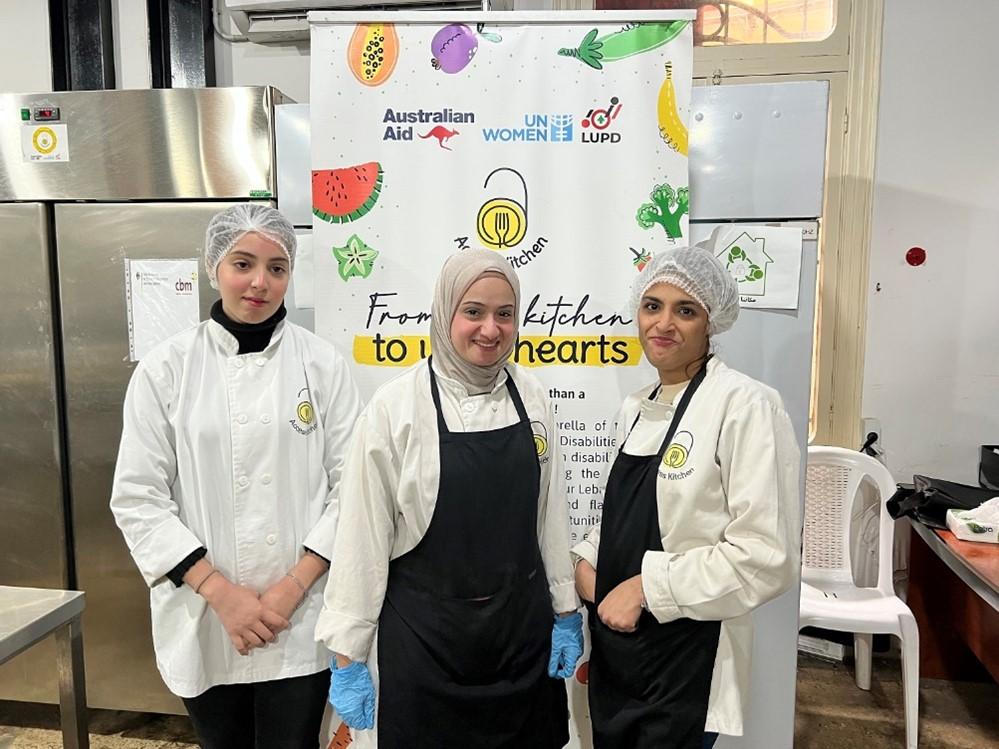
Story
15 May 2024
The Productive Sectors Development Programme (PSDP) Makes a Positive Impact in Lebanon
The Productive Sectors Development Programme (PSDP), which is generously funded by the Government of Canada and implemented by six UN agencies (UNIDO, FAO, UNDP, ILO, UNWOMEN, UNICEF), has aimed for gender-responsive job creation and economic growth with a particular focus on empowering women and youth in disadvantaged areas. Fostering growth through a comprehensive approach The programme has recognized the multifaceted challenges faced by women in the agriculture and agri-food sectors, including limited market access, inadequate infrastructure and skills shortages. To address these issues, the PSDP has adopted a comprehensive approach, working at three levels:At the macro level, the PSDP conducted legislative and policy reviews as well as a gender analysis, with extensive dialogue and consultations with national and international partners. At the meso level, the PSDP has collaborated with the government and the private sector to enhance market access for MSMEs in agro-food. This has involved capacity building, export promotion and networking opportunities.At the micro level, the PSDP has enhanced the competitiveness of value chains like fruits, vegetables, nuts and pulses in northern Lebanon. This has included technological advancements, skills development, business support, market access, amongst others. Celebrating the impact of the PSDP in LebanonRony Gedeon, Partnerships and Development Finance Officer, Resident Coordinator Office (RCO) – Lebanon, said: "The PSDP, funded by the Government of Canada through the Lebanon Recovery Fund (LRF), marks the start of a new approach to development in Lebanon that revolves around partnerships for productive sectors development. The program brought together the UN, donor partners, Lebanese Government, private sector, local partners and most importantly beneficiaries around common objectives and ambitions to help Lebanon’s economic recovery." Alexandra Santillana, First Secretary, Development at the Embassy of Canada in Lebanon, also spoke about the positive impact of the program: “Furthermore, during crises, the PSDP has supported over 2,000 vulnerable individuals and around 300 businesses operating in the agriculture and agri-food sectors by enhancing a favorable business environment. Consequently, this gave them exposure to international markets and empowered businesses, farmers, and cooperatives to thrive and expand.”Santillana added that the PSDP exemplifies Canada’s commitments to supporting Lebanon's productive sectors, fostering economic prosperity, especially for vulnerable women. Moreover, investing in people, specifically women in rural areas, can chart a course toward a more prosperous and resilient future for all.Kawthar Alawa, Owner of ‘Equilibre’, was able to showcase a good resilience in sustaining her business despite the economic crisis that marked business opportunities in Tripoli. She received a recognition award at the closing ceremony of PSDP for her outstanding dedication and commitment. The legacy of the PSDP in LebanonAfter years of dedicated efforts, the PSDP celebrated its achievements with a closing ceremony on April 16 at the UN House. The event acknowledged the successful results and partnerships forged during the programme's tenure, with a booth showcasing PSDP beneficiaries' products and progress at HORECA Lebanon, a hospitality and foodservice trade fair, which attracted almost 20,000 visitors.
Job creation and moreThe PSDP has yielded significant results, with over 2,000 jobs created and sustained: the majority held by women. Additionally, the programme has provided support to over 2,000 vulnerable individuals, including training in various aspects of agriculture and business leadership. Moreover, hundreds of MSMEs and farmers have received direct assistance, paving the way for sustainable economic growth and local development.As the PSDP concludes this chapter, it demonstrated important lessons of empowerment, transformation, and inclusive growth. Through collaborative efforts and unwavering dedication, the PSDP is one chapter of a larger vision for supporting the development of productive sectors in Lebanon. Disclaimer: This story was produced and published by the Hospitality News Middle East, in coordination with the UN Resident Coordinator Office, as part of its strategic partnership in the 2024 HORECA exhibition to showcase the results of the UN Productive Sectors Development Program (PSDP).
Job creation and moreThe PSDP has yielded significant results, with over 2,000 jobs created and sustained: the majority held by women. Additionally, the programme has provided support to over 2,000 vulnerable individuals, including training in various aspects of agriculture and business leadership. Moreover, hundreds of MSMEs and farmers have received direct assistance, paving the way for sustainable economic growth and local development.As the PSDP concludes this chapter, it demonstrated important lessons of empowerment, transformation, and inclusive growth. Through collaborative efforts and unwavering dedication, the PSDP is one chapter of a larger vision for supporting the development of productive sectors in Lebanon. Disclaimer: This story was produced and published by the Hospitality News Middle East, in coordination with the UN Resident Coordinator Office, as part of its strategic partnership in the 2024 HORECA exhibition to showcase the results of the UN Productive Sectors Development Program (PSDP).
1 of 5
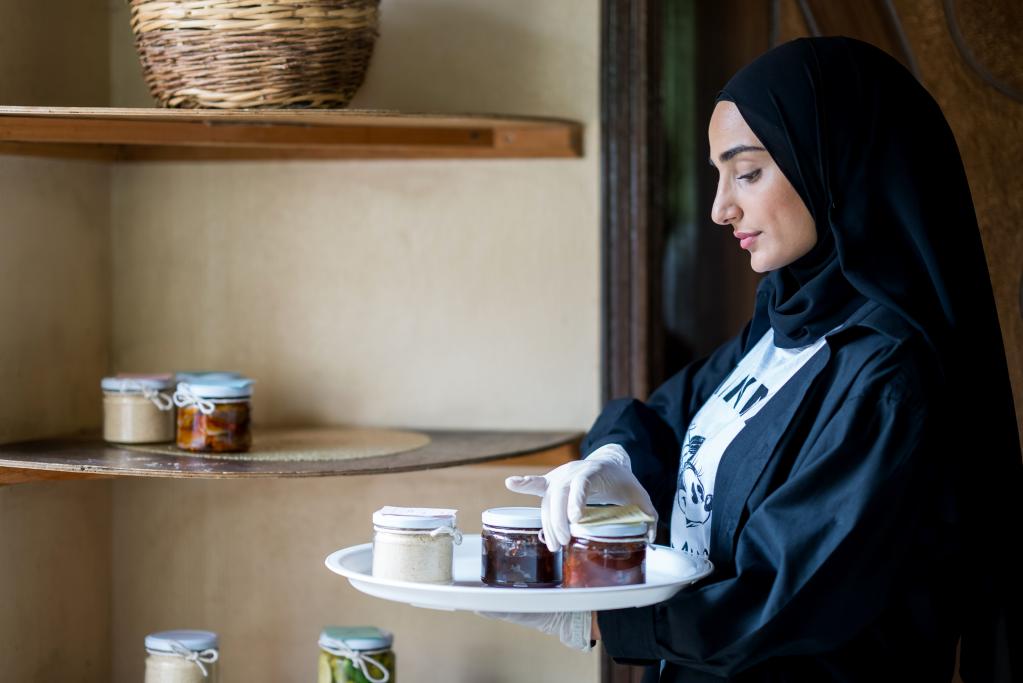
Story
21 October 2025
Families in Lebanon Unite for a Day of Food, Sustainability, and Fun on World Food Day
Under the bright October sun, around 60 people from families, partners, and community members gathered at Nature by Marc Beyrouthy in Lebanon to celebrate World Food Day 2025—a day dedicated to the power of food to connect, sustain, and inspire.Under the patronage of Minister of Agriculture Nizar Hani, the event was organized by ACT 4 Tomorrow NGO in close collaboration with the UN Information Centre (UNIC) in Beirut, the Food and Agriculture Organization (FAO), the World Food Programme (WFP), and the UN Environment Programme (UNEP), in partnership with 4 renowned Lebanese chefs. The Family Day celebration included hands-on activities: live cooking stations with the chefs who showed how we can help reduce food waste by using all ingredients at hand, interactive workshops on upcycling and sustainable practices, guided botanical tours, and awareness sessions on biodiversity and eco-friendly living. Local SMEs were also present, showcasing creative approaches to sustainable food systems and responsible consumption. By reducing waste, supporting local producers, and choosing sustainably, families can play a vital role in building a food-secure future.“This day reminds us that food has the power to bring people together around shared values,” said Paul Sroujean President of ACT 4 Tomorrow. “Through awareness and action, we can turn everyday choices into meaningful contributions to sustainability.”“I am very happy to celebrate World Food Day, which FAO marks each year, and this year it coincides with the Organization’s 80th anniversary,” said Nora Ourabah Haddad, FAO’s Representative in Lebanon. “This remarkable partnership unites children and families in raising awareness of this important cause.” “We are delighted to celebrate World Food Day alongside many inspiring partners that are working together to try to minimize food waste and make best use all the amazing products Lebanon can make”“Through initiatives like this, we celebrate not just World Food Day, but the power of community,” said Cynthia Darrous UNIC Beirut’s Officer-in-Charge. “When families learn and act together, they inspire change that would lead to more sustainable practices.”
1 of 5

Story
21 October 2025
Empowering Journalists in Lebanon to Promote Information Integrity and Support Reform
Together with Maharat Foundation, a women-led NGO in Lebanon that promotes freedom of expression, the UN in Lebanon hosted a one-day workshop to co-create a digital campaign on information integrity as a cornerstone for reforms in Lebanon.Building on the earlier #InformationIntegrity campaign under the slogan: “Information is a right, integrity is a responsibility”, the workshop aims to highlight the crucial role of journalists in promoting transparency, countering disinformation, and empowering citizens to hold institutions accountable. The campaign, to be launched during Global Media and Information Literacy Week (24–31 October), will feature short videos produced by participating journalists that will educate people on countering rumors that distort the reform process, promote accountability and the use of available mechanisms to access information and request transparency, reinforce credibility in institutions and the reform process and encourage media literacy by empowering people to critically analyze sources and consume content responsibly.The workshop, titled “Strengthening the Role of Media in Lebanon’s Reform Path,” gathered journalists, public sector representatives, academics, and media experts to explore how the media can act as a driver of accountability and reform. In the first session, Maharat Foundation presented an overview of the sectoral reform landscape, followed by testimonies from journalists on the challenges they face accessing and verifying information when covering reform-related topics. The second session centered on strengthening transparency and accountability through strategic media engagement. A dynamic multi-stakeholder panel brought together representatives from government institutions, academia, and independent media to explore the press’s role in monitoring reform implementation, identifying systemic gaps, and fostering constructive collaboration between state and media actors. Panelists included Dr. George Sadaka, former Dean of the Faculty of Information at the Lebanese University; Ms. Lamia Moubayed, President of the Basil Fuleihan Institute of Finance and Governance; Dr. Iman Alaiwan, Head of the Media Department at the Arab University of Beirut; and investigative journalist Edmond Sassine. Participants then worked collectively to identify messages and storylines for the upcoming digital campaign, emphasizing the need for credible information as the foundation of meaningful reform and public trust.UNIC Beirut Officer-in-Charge Cynthia Darrous said in her opening statement, “media that conveys accurate, reliable, and evidence-based information helps shape an informed public opinion and creates positive pressure that pushes the reform process forward.” “Information Integrity is not a minor detail — it's a safeguard for the right to knowledge. It fortifies society against rumors and misinformation and protects accountability from distortion,” she added. Mr. Hussein Sherif, Maharat's representative, said: “At Maharat, we believe that accurate information is the foundation of accountability. Independent, evidence-based journalism bridges citizens and institutions, transforming public discourse from complaint to participation, and from rumor to understanding. Our partnership with the United Nations builds on a shared commitment to strengthen information integrity, empower citizens through media literacy, and restore trust in the reform process.” The workshop was held at the Movenpick Hotel in Beirut, with the participation of around twenty journalists from various local media outlets.
1 of 5

Story
02 September 2025
UN Supported, Self-Empowered: Lebanon’s Young Women Redefine Leadership
When someone raised their voice in a room, Reem Herzallah’s instinct was always to leave. The Beirut Arab University student avoided conflict, believing that her place was to stay quiet while others dominated the conversation.“I thought I had no role when the discussion got heated,” she admits softly. “I used to think leadership was for people louder than me.”Today, Reem is the one guiding those conversations. “Now I know how to lead that dialogue. I understand our role as young women in shaping the spaces we belong to.”Reem’s journey from silence to voice is not just her own; it reflects a broader transformation taking root across four major universities in Lebanon, namely the Lebanese University, Université Saint-Joseph, the American University of Beirut, and the Beirut Arab University. Under the broader UN-led Women’s Participation in Leadership (WIPL) project, campuses have become spaces for dialogue, leadership training, and inclusive participation, helping young women step into roles where their voices truly matter.Finding ConfidenceLebanon’s young people are coming of age amid economic downturn, political instability, and recurring conflict. For young women, the barriers to leadership are even higher.To address this, the United Nations in Lebanon, through UN Women and UNDP, partnered with four universities in Lebanon to create safe and inclusive spaces where students could practice civic leadership. Around 250 young women joined workshops and community projects that gave them more than skills; they gave them courage.At the American University of Beirut, Dana Al Hachem recalls how lost in her first year. “I didn’t know what to expect, and I felt completely alone,” she says. But after joining the UN-supported program, Dana began speaking up, organizing events, and even mentoring peers. “Now I love helping younger women who are like me, whether in academics, clubs, or student life.” Role Models that Spark ChangeFor many, the turning point came when they met women leaders who looked like them.“Everything shifted when I attended an UN-facilitated dialogue with MPs on women’s political participation,” says Leony Lawandos. “They didn’t just challenge the system; they claimed space in it. They showed me we don’t need permission; we already belong at the table as equal citizens.”Another student, Jenna Kheireddine, was inspired watching MP Halima Kaakour speak out in Parliament. “We have the right to be heard not only on gender issues but on all issues,” she says. “We’re the same as men and everyone else at that table, and we deserve respect.”Safe Spaces in a Time of CrisisWhen Lebanon’s crises felt overwhelming, Nouhad Hajj from the Lebanese University found refuge in Ondes’ theater-based leadership exercises. “Every moment we worked together, I could feel something shifting inside me,” she said. “We created a safe, non-judgmental space where everyone’s voice mattered.” Those improvised scenes revealed her power to speak truths and listen deeply. That stage became the launching pad for Nouhad’s own storytelling workshops, where solidarity turns pain into resilience. At Université Saint-Joseph, Hala Dalloul echoes this feeling: “Despite all the challenges, we didn’t miss a single session. It became our safe space. We grew not just as students, but as changemakers.” From Learning to Action Students soon turned their lessons into action. At Beirut Arab University, Diana Hamo and her peers launched environmental campaigns encouraging eco-friendly habits. “It was our way of contributing to a greater cause”, she said. Others, like Sarah Youness, promoted democratic participation on campus by supporting student elections and fostering political dialogue.Each initiative- whether on climate, equality, or civic life- was an act of agency: proof that these young women are not waiting to be invited into leadership; they are creating it. Redefining LeadershipWhat unites these journeys is the reimagining of leadership itself. For these students, leadership is not about hierarchy or loud voice, it is about inclusivity, courage, and creating space for others to lead.In a country where women hold less than 7 percent of parliamentary seats and youth voices are often sidelined, these shifts may seem subtle, but they are profound. They hint at a new kind of civic life, one where young women not only belong but also set the tone.As Jenna puts it: “Now when I speak, I no longer wonder if I belong. I know I do, and I’ll keep that space open for others too, ensuring women are heard and respected on all issues.” These initiatives are implemented by UN Women and UNDP with the support of the Government of Canada, in close partnership with several local stakeholders.All of these young women’s stories would not have been possible without the generous support from the Government of Canada, one of Lebanon’s top donors. Since 2016, Canada has contributed almost $540 million USD to Lebanon, strengthening protection, gender equality, social stability, food security, and health, among others. Canada is also a strong champion of pooled funding, supporting both the Lebanon Humanitarian Fund (LHF) and the Lebanon Recovery Fund (LRF). Further details on international assistance to Lebanon are available in the Lebanon Aid Tracking reports: https://lebanon.un.org/en/110415-aid-lebanon-tracking-development-aid-received-lebanon **This story was co-drafted by Ms. Roula Rached (UN Women), Ms. Maryam Sweid (UNDP), and Ms. Nadine Abi Zeid Daou (RCO/UNIC Beirut). The accompanying video was produced by Mr. Georges Roukoz, a videographer contracted by UN Women.
1 of 5

Story
09 March 2025
"In Memory of Dina": On International Women's Day, A message of Pain & Hope from Lebanese Mother to Women in Conflict Zones
“Dina was exceptional in every way—passionate about everything she did, and everything she did came from the heart. Her work with the United Nations was a mission to serve others.”This is how Mrs. Ghada Darwish described her daughter Dina—her colleague at the United Nations High Commissioner for Refugees (UNHCR), who was killed during the Israel-Hezbollah war in 2024 in Lebanon.Dina Darwish worked with UNHCR for 12 years at the Bekaa office. She and her youngest son were killed when the residential building where she lived with her husband and two children was hit by an Israeli missile on September 23 of last year.In an interview with UN News, Mrs. Ghada Darwish said: “The greatest pain you can ever feel is losing your own child. No matter how much you try to adapt to the idea of loss, the pain remains immense.” It is difficult to sum up a child’s life in just a few minutes, but Mrs. Ghada tried her best to stay composed to speak about her own child, Dina. Despite being unable to hold back her tears, she insisted on talking because her ultimate goal is “not to forget Dina—she wants her to remain close to hearts, minds, and memories.”“Dina was exceptional in every way, passionate about everything she did. Everything she did was from the heart, from her studies to university and her work. She never settled for half-measures—she was a true professional.”Mrs. Darwish said that Dina always wanted her voice to be heard in her work so she could change the world and help as many people as possible. Thanks to her specialization in social sciences, she worked against gender-based violence and protected children, especially during her tenure with UNHCR.Throughout her career, she helped many families, children, and women by relocating them to safer and more peaceful environments—away from the conflict, displacement, violence, and poverty they had endured.Mrs. Ghada Darwish also spoke about Dina’s friendships and her impact on the community. “In her work, she built strong friendships with many of her colleagues. She made everyone feel special and unique. But tragically, she fell victim to violence—violence she had no part in and no connection to. What happened was a great injustice.” The violence also claimed the life of Dina’s four-year-old son, Jad, who was described by his grandmother as “a special child whose smile never left his face. He was curious, full of life and energy. Everyone who knew Jad fell in love with him—his eyes sparkled, and he gave so much love and warmth.”Ghada continued the conversation, trying to explain how living in a conflict zone or war-torn area is incredibly difficult—especially for mothers who must protect and reassure their children while raising them with love for their homeland and instilling good values in their daily lives.“I always supported the idea that love for one’s country should be in our hearts. I always hoped for a better tomorrow and believed, as a woman and a mother, that I should instill that hope in my children so they could continue this journey, dream, and strive for a better future. I never imagined that we would reach this point in our country.”On International Women’s Day, Ghada’s message to women around the world—especially those who have lost loved ones in war—is one of solidarity, strength, and hope.“We must not despair; we must not stop. This loss should not halt our lives. We must be beacons of resilience. The world sees itself through us, and that’s why we must hold on to courage and keep fighting for our families.”She concluded her speech by saying: “Despite the pain we feel, we must transform this pain into love and struggle to stop wars around the world. To every woman out there: You are strong, you are important, you are the backbone of your family, and you are its pillar of support.”The two-month conflict in 2024 in Lebanon between Hezbollah and Israel resulted in the deaths of more than 4,000 people, with at least 16,600 others injured, and led to the displacement of hundreds of thousands amid widespread damage to infrastructure. The interview was conducted by Mrs. Rana Sarkis, and the story was initially published in Arabic by UN News.
1 of 5
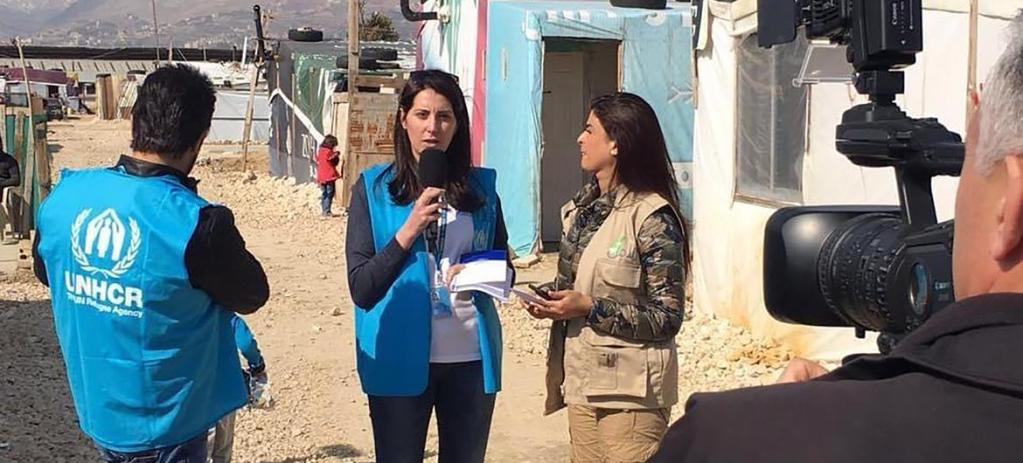
Story
04 September 2024
Shaping a Greener Future: How the Greening Education Initiative Equips Young Minds for Sustainability
Implemented by UNESCO in partnership with the Center for Educational Research and Development (CERD) in Jounieh where it is located, the Green Demonstration Room plays a crucial role in preparing students to tackle environmental challenges. It provides essential knowledge and skills for a climate-ready future."If I were to build a house in the future, it would be environmentally friendly by relying on solar energy and wind turbines to meet the house's energy needs without polluting the environment." – Bahaa El Din, 14 years oldSince its activation, the Green Demonstration Room has made a significant difference. In 2023, it welcomed 525 students from 21 schools. This year, it has hosted 1582 students from 70 schools, showing the growing importance of environmental education. Students like Bahaa learn practical ways to support a sustainable future, such as using renewable energy and recycling.The program offers a well-rounded educational experience. It begins with a training at the Green Demonstration Room, where students engage in activities covering green building concepts, energy efficiency, water conservation, environmental issues, physical phenomena, cultural arts, and music. This holistic approach helps students gain a broad understanding of sustainability.Yara Constantine, a biology teacher, observes, "Through this day, the students have learned how to protect the environment in very simple ways." Students also learn about alternative energy sources; as Nivine Saab, a math teacher, notes, "They also learned how to produce electricity using alternative methods to the commonly known ones." Amal Al Qays, a supervisor and health advisor, shares, "We are very excited to go home and implement everything we have learned here." These testimonials reflect the transformative power of the Greening Education Initiative in shaping young minds to think and act sustainably. The hands-on experience and comprehensive educational approach inspire both students and teachers to embrace environmental responsibility.After visiting the Green Demonstration Room, students continue their learning through various school-based activities. They receive a Certificate of Commitment, pledging their dedication to environmental conservation. This certificate marks their transformation into climate action ambassadors, empowering them to promote sustainable practices within their communities. As agents of change, these students are committed to applying their newfound knowledge to inspire their peers and families, particularly within their schools and homes, fostering a culture of environmental responsibility.Maysoun Chehab, Chief of Education and Senior Program Specialist at UNESCO Beirut Office, reflects, "The Greening Education Initiative in Lebanon, supported by UNESCO, is not just about imparting knowledge; it’s about inspiring young minds like Bahaa El Din to envision and create an environmentally friendly world. By equipping Lebanese students with commitments, tools, and understanding to harness renewable energy and adopt sustainable practices, we are empowering them to become the architects of Lebanon's sustainable future, ensuring a greener tomorrow for their nation."Looking ahead, the initiative will expand its impact through several key activities. Upcoming events in 2024 will include significant training opportunities. In September, UNESCO Beirut will host 48 teachers and 24 principals from 24 schools for Teachers and Principals Training who will be trained by the Center for Educational Research and Development (CERD) experts. The training aims to equip school leaders with the tools and knowledge needed to integrate sustainable practices effectively within their institutions.Moreover, the development of a comprehensive strategy for sustainable education is moving towards completion. The Center for Educational Research and Development (CERD), supported by UNESCO, is finalizing a National Policy on Greening Education. This strategy is being shaped by a National Committee that includes representatives from nine key ministries, fifteen Lebanese NGOs focused on sustainability and youth, relevant agencies, the private sector, and parent representatives. Their collaborative work is crucial for establishing a unified approach to climate change education in Lebanon.The Greening Education Initiative is essential for equipping students, educators and their community with the knowledge, skills, and competencies needed to navigate the green and digital transitions. Through this initiative, education becomes a powerful tool for fostering environmental stewardship and preparing the next generation to tackle global challenges.
1 of 5
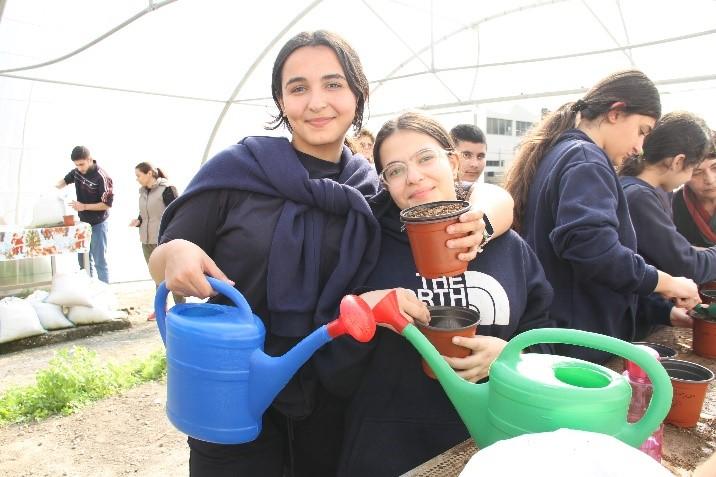
Press Release
31 October 2025
United Nations Lebanon and Maharat Foundation Launch Second Phase of #InformationIntegrity Campaign in support of the Reform Process
This new phase highlights the vital role of information integrity as a foundational pillar of Lebanon’s reform process, promoting accountability, transparency, and citizen engagement through responsible journalism and informed public discourse. Anchored in the UN Global Principles on Information Integrity, the campaign aims to reinforce the credibility of the media as a partner in reform, enhance public accountability, and build resilience against disinformation.The campaign features a teaser video followed by 15 informative videos featuring Lebanese women and men journalists discussing key issues related to reforms, good governance, and information integrity. Through their voices, the campaign seeks to empower journalists and citizens alike to critically engage with information, counter disinformation, and advocate for evidence-based decision-making and inclusive reform. Each video tackles a distinct aspect of how integrity in information supports the reform process, including: The role of media in combating disinformation and advancing reforms; The impact of rumors and false narratives on public trust; The importance of access to information and accountability mechanisms; The role of evidence-based discourse in building credibility; Responsible use of social media; and how media and information literacy empower citizens to actively participate in reform.“The integrity of information is central to rebuilding public trust and advancing reforms,” said Imran Riza, UN Deputy Special Coordinator, Resident and Humanitarian Coordinator for Lebanon. “Disinformation weakens institutions, undermines accountability, and erodes civic confidence. This campaign reaffirms our collective commitment to promoting an informed and engaged citizenry as the foundation for Lebanon’s reform journey.”Roula Mikhael, Founder and Executive Director of Maharat Foundation, emphasized: “Reform cannot succeed without access to accurate information and transparency. With this joint campaign, we aim to empower journalists and citizens to be active players in protecting information integrity and holding institutions accountable. It is only through informed public debate that meaningful reform can take root.”Through the #InformationIntegrity digital campaign, the United Nations and Maharat aim to raise awareness of how disinformation undermines reform efforts, promote media literacy and evidence-based dialogue, and encourage civic participation through access to trustworthy information. The campaign emphasizes that a society founded on truth and transparency is crucial to Lebanon’s reform path and to rebuilding public trust in its institutions. ***END *** About UN Lebanon: The United Nations system in Lebanon comprises 26 agencies, funds and programmes, as well as a peacekeeping mission, a political mission, and a regional commission that cover a broad spectrum of peacekeeping, political, development, human rights and humanitarian work in Lebanon. The United Nations supports Lebanon in promoting the country’s long-term peace and security, development, and human rights priorities. Follow UN Lebanon on X, Facebook , Instagram and YouTube. About Maharat Foundation: Maharat is a women-led freedom of expression organization based in Beirut dedicated to campaigns grounded in research and strengthening connections between journalists, academics, and policy makers.It advances and enables freedom of expression, quality information debate and advocates for information integrity online and offline. Maharat promotes innovation and engages the journalistic community and change agents within Lebanon and the wider, MENA region to promote inclusive narratives and debates and to counter misinformation, disinformation, and harmful content. Follow Maharat on X, Meta, Instagram. For media inquiries and further details, please contact: From Maharat: Ms. Layal Bahnam, Program Manager, layal.bahnam@maharatfoundation.orgFrom the United Nations: Ms. Nadine Abi Zeid Daou, National Information Officer at UNIC Beirut/RCO Lebanon, daou@un.org
1 of 5
Press Release
31 October 2025
Over USD 1.5 Million in Support for Lebanese Women-Led Businesses Driving Economic Recovery
The awarding ceremony, held at the Lebanese Industry Expo’s Seaside Arena in Beirut, took place in the presence of the Minister of Industry Joe Issa El Khoury, Canadian Ambassador Gregory Galligan, UNIDO Regional Representative, Emmanuel Kalenzi, and UNDP Resident Representative in Lebanon Blerta Aliko. The event gathered nearly 200 participants, including representatives of women-led businesses, government institutions, diplomatic missions, chambers of commerce, and women’s associations. Minister of Industry Joe Issa El Khoury reflected on the resilience of Lebanese entrepreneurs, saying: "The strength of Lebanon has always been its people, those who work, produce, and believe that every factory light that stays on is a light for the whole nation." He added: "True entrepreneurship shines in adversity because every challenge in Lebanon is also a chance to innovate, stand out, and build trust through quality and persistence. Resilience, creativity, and solidarity are your greatest competitive advantages, and your success, however small today, is part of Lebanon’s collective industrial rebirth."As part of the project, UNDP and UNIDO supported 45 women-led enterprises in its first phase earlier this year, allocating USD 706,000 in March 2025 as emergency assistance to help them sustain production, improve quality, enhance market access, and safeguard livelihoods after recent hostilities. With today’s announcement, the total USD 1.106 million in grants has now been disbursed to 96 SMEs, complemented by UNIDO’s technical support to strengthen operations and expand market opportunities. The ultimate objective of the project is to support more than 1,000 women-led businesses in accessing the needed services to grow and expand. In his remarks, Ambassador of Canada to Lebanon, Gregory Galligan, said: "Canada is proud to partner with UNDP, UNIDO, and the Government of Lebanon to empower women entrepreneurs who are transforming their ideas into impact. Through the Women’s Economic Empowerment Project, we are investing in Lebanon’s recovery and future. These 51 women-led enterprises reflect the creativity and determination needed to drive Lebanon’s economic renewal."Micro, small, and medium-sized enterprises (MSMEs) represent 90% of Lebanon’s economy and remain the backbone of local livelihoods. Yet women-led businesses have been among the hardest hit by the country’s overlapping crises, with the 2024 war forcing many to suspend operations and, in the hardest-hit areas, close entirely. In his opening remarks, Emmanuel Kalenzi, UNIDO Regional Representative, said: “Today’s ceremony is more than a grant award; it is a recognition of resilience, creativity, and leadership of Lebanese women entrepreneurs. It is a celebration of what happens when determination meets opportunity and when women are empowered to innovate, manufacture, and lead businesses.”In her turn, UNDP Resident Representative in Lebanon, Blerta Aliko, said, " Empowering women in business not only strengthens economic recovery but also paves the way for a more equitable and sustainable future for Lebanon. This is the role UNDP is proud to play: supporting Lebanon’s small and medium businesses, the backbone of the economy, and ensuring women are at the heart of recovery.”
The new group of beneficiaries spans Beirut, Mount Lebanon, the Bekaa, North and South Lebanon. Their businesses, active across the agro-food, cosmetics, and creative industries, are expected to create new jobs, sustain family incomes and livelihoods, and unlock new market opportunities. The event was followed by the inauguration of the “WEE Booth” at Lebanese Industry, featuring products from the 51 women-led businesses showcasing a wide range of agro-food, cosmetics, and creative products. For more information please contact:Ms. Kawsar Fahs, Head of Communications |📞 +961-81-478-691| 📧 kawsar.fahs@undp.orgMs. Maryam Sweid, Communications associate |📞 +961-79-368-605 | 📧 maryam.sweid@undp.org
The new group of beneficiaries spans Beirut, Mount Lebanon, the Bekaa, North and South Lebanon. Their businesses, active across the agro-food, cosmetics, and creative industries, are expected to create new jobs, sustain family incomes and livelihoods, and unlock new market opportunities. The event was followed by the inauguration of the “WEE Booth” at Lebanese Industry, featuring products from the 51 women-led businesses showcasing a wide range of agro-food, cosmetics, and creative products. For more information please contact:Ms. Kawsar Fahs, Head of Communications |📞 +961-81-478-691| 📧 kawsar.fahs@undp.orgMs. Maryam Sweid, Communications associate |📞 +961-79-368-605 | 📧 maryam.sweid@undp.org
1 of 5
Press Release
27 October 2025
Digitization of Lebanon’s social security records marks major step toward implementing new pension scheme
With funding from the UK government through the project “Supporting Social Security and Institutional Reforms Towards a Strengthened Social Protection System in Lebanon,” the ILO provided technical assistance to the initiative.A specialized data entry firm was engaged to digitize a backlog of approximately 850,000 individual records from nominative yearly declarations covering the period from 2021 to 2024. In a subsequent phase, these digital records underwent a rigorous validation process to ensure their accuracy and completeness before being integrated into the NSSF’s central database.This project plays a critical role in maintaining a reliable and up-to-date database, which is essential for evidence-based policymaking. It enables technical analysis for informed decision-making, particularly in addressing the end-of-service indemnity challenge and facilitating the smooth rollout of the new pension scheme. Importantly, it also ensures that all accrued benefits are accurately recorded, safeguarding contributors’ rights and reinforcing the transparency, integrity and sustainability of Lebanon’s social protection system.“This important achievement paves the way for conducting the necessary actuarial studies to finalize all implementing decrees required to launch the pension and social protection system by the end of 2026,” said the Director General of the National Social Security Fund, Dr. Mohamed Karaki. “I also want to extend my appreciation to the International Labour Organization for its continued technical assistance to the Fund over the past years, and to the Uk government for its support in completing this project.”"This milestone reflects the strength of our partnership with the NSSF and our shared commitment to building a more resilient and inclusive social protection system in Lebanon,” said ILO Regional Director for Arab States Ruba Jaradat. “Digitizing these records lays the groundwork for a transparent and sustainable pension scheme that protects the rights of all contributors. We are also grateful for the support of the United Kingdom, which has been instrumental in advancing this important work.”British Ambassador to Lebanon Hamish Cowell said: “The digitisation of Lebanon’s social security records is a vital step toward building a more transparent and inclusive social protection system. We're proud to support this initiative, which strengthens institutional capacity and lays the foundation for the successful implementation of the new pension scheme.”“This partnership also reflects our ongoing commitment to support the government of Lebanon's national systems and make them stronger and more inclusive.”Looking ahead, a comprehensive digital transformation of the NSSF is envisaged, aimed at significantly enhancing the efficiency, transparency, and accessibility of its services. -Ends-About the ILO: Advancing social justice, promoting decent workThe International Labour Organization is the United Nations agency for the world of work. We bring together governments, employers and workers to drive a human-centred approach to the future of work through employment creation, rights at work, social protection and social dialogue.
1 of 5
Press Release
24 October 2025
UN Lebanon Marks 80 Years of Partnership with Lebanon on United Nations Day
On this occasion, the UN in Lebanon partnered with the state-run Tele Liban for a special edition of its morning show “Ahla Sabah” on 24 October. The live episode brought together UN partners, experts, and staff members who highlighted the UN’s role and impact across key sectors within the spectrum of peace and security, development, humanitarian affairs, and human rights. The program showcased real stories of impact and collaboration, reinforcing the UN’s long-standing commitment to work with and for the people of Lebanon.
In the spirit of this joint partnership, the UN Special Coordinator for Lebanon Jeanine Hennis-Plasschaert said in a statement earlier today: “The United Nations will continue to work side-by-side with the Lebanese State and its people in pursuit of stability and prosperity for all.”As part of the anniversary, the UN Communications Group (UNCG) in Lebanon, chaired by the UN Information Centre in Beirut, has also launched a national youth audiovisual competition in partnership with the UN Global Compact Network Lebanon and the UN Youth Taskforce to showcase youth perceptions and expectations of the UN’s work and impact in their communities. Winning submissions will be celebrated during a recognition event in November this year.
******
Notes to Editors:
The United Nations Day, observed annually on 24 October, marks the anniversary of the entry into force of the UN Charter in 1945.The United Nations system in Lebanon brings together 26 agencies, funds, and programmes, as well as a peacekeeping mission, a political mission, and a regional commission that cover a broad spectrum of peacekeeping, political, development, human rights, and humanitarian work in Lebanon. The United Nations supports Lebanon to promote the country’s long-term peace and security, development, and human rights priorities.
In the spirit of this joint partnership, the UN Special Coordinator for Lebanon Jeanine Hennis-Plasschaert said in a statement earlier today: “The United Nations will continue to work side-by-side with the Lebanese State and its people in pursuit of stability and prosperity for all.”As part of the anniversary, the UN Communications Group (UNCG) in Lebanon, chaired by the UN Information Centre in Beirut, has also launched a national youth audiovisual competition in partnership with the UN Global Compact Network Lebanon and the UN Youth Taskforce to showcase youth perceptions and expectations of the UN’s work and impact in their communities. Winning submissions will be celebrated during a recognition event in November this year.
******
Notes to Editors:
The United Nations Day, observed annually on 24 October, marks the anniversary of the entry into force of the UN Charter in 1945.The United Nations system in Lebanon brings together 26 agencies, funds, and programmes, as well as a peacekeeping mission, a political mission, and a regional commission that cover a broad spectrum of peacekeeping, political, development, human rights, and humanitarian work in Lebanon. The United Nations supports Lebanon to promote the country’s long-term peace and security, development, and human rights priorities.
1 of 5
Press Release
24 October 2025
United Nations Special Coordinator for Lebanon Jeanine Hennis-Plasschaert Statement to Mark United Nations Day
In 1945, Lebanon was one of the founding States which gathered to form the United Nations as an attempt to avoid further suffering for humankind after the devastation of the Second World War. In the decades since, a strong partnership has been built between the Organization and Lebanon. The latter carved out its space in the multilateral arena, not least through its contribution to the drafting of the Universal Declaration of Human Rights in 1948, while the United Nations, with its peacekeeping and political missions, and its dedicated agencies, funds and programmes, accompanied the Lebanese people throughout different stages – many of which were marked by crises and turmoil. This year’s United Nations Day falls amid uncertain times for Lebanon. Since it was last marked, as hostilities escalated in 2024, momentous efforts have been made by Lebanese authorities and the Lebanese Armed Forces, which have breathed some life into long-stalled provisions of United Nations Security Council resolution 1701 (2006). Yet, with much of the south of the country still in ruins, significant funding shortfalls and continued uncertainty on how the near future will look, patience is something which, although in low supply, is still being asked of the Lebanese people.History has left its mark and the underlying causes of past cycles of crisis have not yet been addressed. But collective efforts, in support of Lebanon's valiant, uphill climb are ongoing. And while it is true that hard work is still ahead, both at the domestic and regional levels, Lebanon has made clear that there is no turning back from its current path towards progress. The country has, throughout its life, been hampered by systemic political and economic failures, but never by its people. The United Nations will continue to work side-by-side with the Lebanese State and its people in pursuit of stability and prosperity for all.
1 of 5
Latest Resources
1 / 11
Resources
29 November 2024
Resources
07 March 2024
1 / 11





















